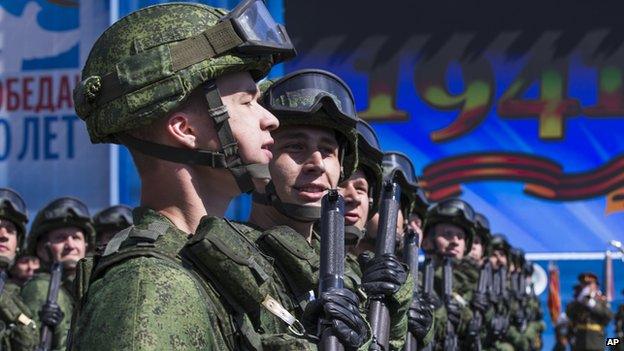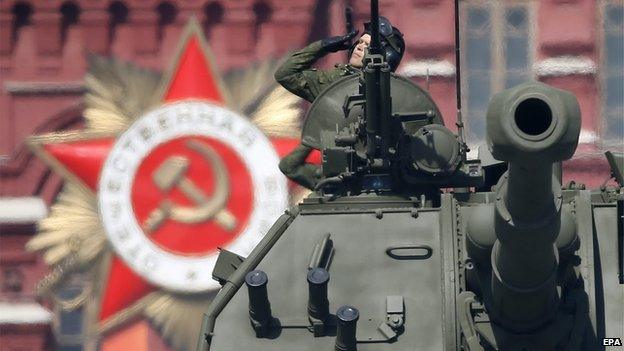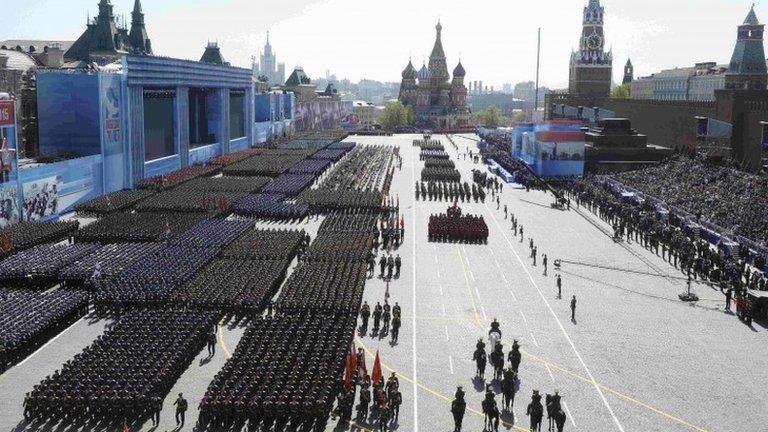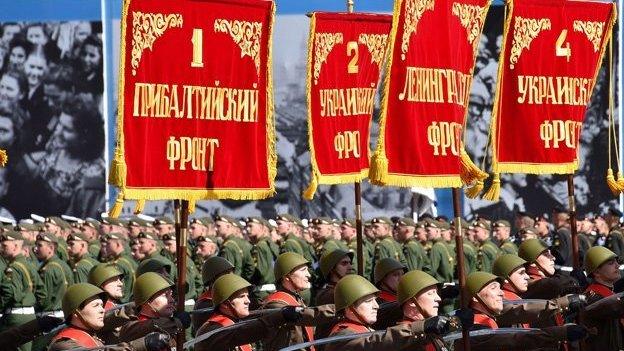At the scene: WW2 parades in Russia and Ukraine
- Published

Russian soldiers march during the Victory Parade in Moscow
Russia's giant military pageant honouring Soviet troops who died in World War Two was shunned by Western leaders.
Tensions over the Ukraine conflict made this 9 May special - a chance for Russia to display its military might. Here BBC correspondents in Moscow and Donetsk in eastern Ukraine describe the controversial Victory Day parades.

Bridget Kendall, Moscow:

The scale of the Moscow parade echoed Soviet Cold War tradition
The celebration of Victory Day on 9 May is always an important holiday for Russians. And this year's 70th anniversary was always going to be an occasion to pull out the stops. But compare this year's foreign guest list with previous years.
Ten years ago, standing next to President Putin on the podium was the US President, George W Bush.
In 2010, Welsh Guards from the UK marched across the Red Square cobbles, resplendent in their traditional scarlet tunics and black bearskin hats.
But this time, instead of Russia's European wartime allies, standing next to President Putin was the Chinese President, Xi Jinping. Other VIPs included the presidents of India, Egypt, and South Africa, Central Asian leaders, and longstanding Russian friends like Cuba and Venezuela.
Most Western leaders stayed away in protest at Russia's actions in Ukraine, sending their ambassadors to the parade instead.
Some denied it was a boycott, but the message was clear. "It wouldn't be appropriate for Western leaders to stand on a military podium with Mr Putin after Russia's annexation of Crimea," said one European diplomat.
Most EU countries which did send senior envoys, like the French foreign minister, the Czech and Slovak leaders, and - for Britain - Churchill's grandson Sir Nicholas Soames MP, carefully sidestepped the military parade. They recognised Russia's wartime role by laying a wreath at the Tomb of the Unknown Soldier instead.
So do Russia and Mr Putin care about this snub? Kremlin officials have played down any sense this was a slight. President Putin even publicly thanked Britain, France and the United States in his Kremlin speech.
And for most Russian people, the focus is clearly on their nation and its history, the grandparents and great-grandparents so many of them lost, the precious and dwindling number of veterans, and a reinvigorated sense of patriotism and national pride.

Tom Burridge, Donetsk:
Pro-Russian rebels organised their own Victory Day parade
There was a real sense of celebration in Donetsk. Crowds of people held black and white photos of their ancestors who lived through, and served during, World War Two, as they marched past Lenin Square.
"Spasibo!" (thank you) they shouted, at the long line of Red Army veterans, who sported Soviet military uniforms as well as an impressive mish-mash of colourful medals on their jackets.
There was a real sense of remembrance.
But as the soldiers from the army of the self-declared Donetsk People's Republic shouted, and the families watching cheered them on, you could not escape the fact that the tanks and rocket launchers, rolling through the main rebel-held city in eastern Ukraine, are being used in the current conflict against Ukraine.
This parade was nothing on the scale of Moscow. But the show of military might in Donetsk was poignant and at times triumphant.
Symbols everywhere: the VE Day orange-and-black ribbons worn in Russia, the black-red-blue flag of this rebel-held, generally unrecognised "republic". And one young man wore a white tracksuit, the word "Russia" on the back.
- Published9 May 2015

- Published9 May 2015
